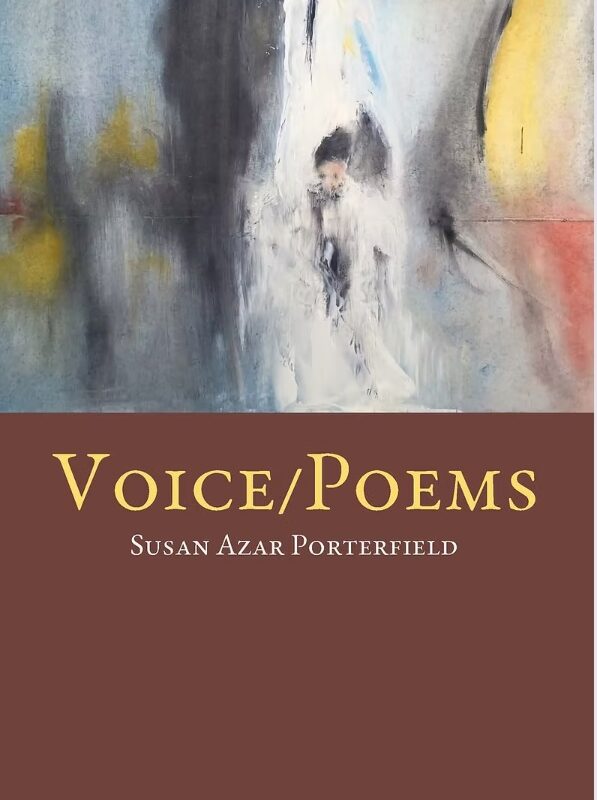Susan Azar Porterfield grew up in Chicago and has spent her career teaching and writing in northern Illinois. Voice/Poems, published by Trio House Press in Minneapolis, is her fourth book of poetry. The book takes its structure from the title poem, “Voice,” which is about a child hearing voices at night. Four lines from “Voice” provide titles for the four sections of the book, each of which is quite different from the next. In an interview about the book, Porterfield says that books of poems are “peripatetic–you never know what you’re going to get.” And I found that to be delightfully true of this collection.
In that same interview, Porterfield said that while she is interested in the concept of poetic voice, “I think I can say that a poet may have, can have, more than one voice.” As someone who is currently working on persona poems, I found this point of view refreshing and encouraging. Many voices speak in these poems, for example part III. I Shall Go into a Hare, is a series of persona poems in which the Soul and the Self are in conversation in a humorous, surreal exchange that both explores existential questions and laughs at itself. For example in “Heisenbergian Humor” the Soul and Self try measuring each other “for posterity,” or are they measuring one another’s “posterior?” “They decide to try this again/when neither one is looking.”
Part II also contains a series of related poems, this time about a house. As a poet I have worked on poems that belong together as a set that is too small to be a chapbook but too long to submit as a unit to poetry journals, and it was interesting to me to see how Porterfield structured her book to incorporate two series of this nature. Reading a series of eight to ten poems that belong together as a unit is quite different to reading a single poem or a book-length collection of loosely related poems. According to Porterfield, a series of poems creates “a different kind of suspense” to the what-will-come-next kind of suspense that comes from reading one self-contained poem after another. The poems in the house series speak to one another a bit like the Soul and Self do, making something as seemingly inert as a house come alive.
Part I. A Laughing so Sharp, contains several of my favorite poems. I enjoyed them because I recognized something in them–one of the pleasures of poetry is when a poem leaves space for the reader to bring her own experiences and create meaning between the speaker and the reader, in other words, to participate in the poem. Several poems in this section explore the suffering of both humans and animals. In “All God’s Creatures” the speaker puzzles over the human desire to eat meat. Why does that desire exist and does it have to be this way? I’ve wondered about that too. In the poem the answer to that question seems to be that God did it for entertainment:
because after God had performed the world, there
wasn’t much else to do. And being God, God foresaw
that God would get bored, so the suspense kept God’s
attention. How would it all turn out? Stay tuned to see if humans
finally grow more angelic. Will they swing that sledgehammer?
There’s a lot to think about there. In a related poem, “Some Dog Barking” the speaker hears a dog somewhere in the neighborhood barking incessantly. But the point is not annoyance, it’s that whether the dog barks out of neglect or for other reasons, or if the dog has stopped barking, why? The problem of the barking belongs to the speaker (and the reader) because ultimately all life is connected and accountable to other forms of life.
This belonging shows up again in Part IV. Wander Window. In “Ubiquitous Porosities” the speaker ponders the strangeness of the way people remember strangers, and how for some person somewhere she is that stranger:
Someone I don’t know remembers me,
my picture stored in a psyche-file,
mind-drawer that opens now and then,
when they’re 3 am thought-cycling
and here’s that jolt: Oh, her again
What to do about these connections that we neither create nor can shake off? I see an answer in the poem “From a Perception of Only 3 Senses or 3 Elements None Could Deduce a Fourth or Fifth”
The brain, I’m told, jigsaws how eye sees,
piecing in gaps with what it expects is there.
Blake saw angels perched in a tree
and imagined in gold leaf the ghost of a flea.
I want to choose to believe in the good.
Voice/Poems has quite a number of epigrams and references to other poets (i.e. William Blake, W. B. Yeats, Rilke, Ross Gay, Alfred Noyes) which I think underscores the theme of connectedness that runs through the book. All poets and writers are indebted to their predecessors and all writing is in some sense derivative. It was interesting to see that acknowledged in these references to other poets, and I think it speaks to the title itself, and the concept of poetic voice. We each use a somewhat different voice depending on who we are speaking with, and Porterfield does the same in her poetry, with the voice that completes each of these intimate poems belonging to the reader.
Emily Updegraff
Emily Updegraff is a staff member and an MFA student at Northwestern University. She has published poems in journals including Third Wednesday, The Orchards Poetry Journal, River and South Poetry Review, and Dialogue, and is a book review contributor at Great Lakes Review.
